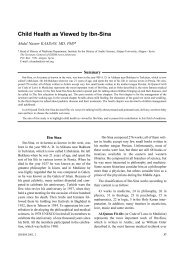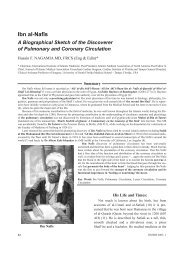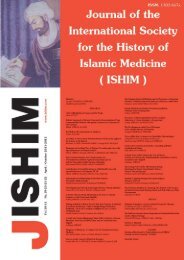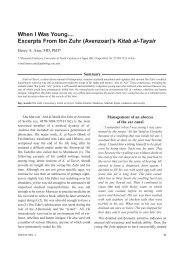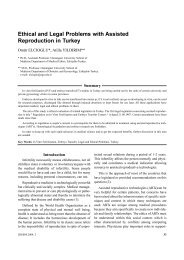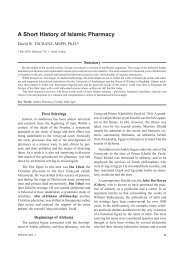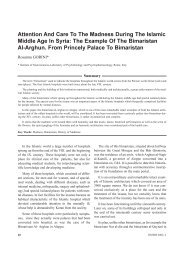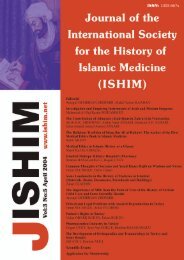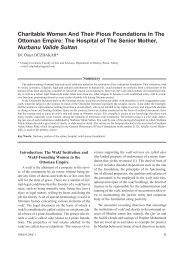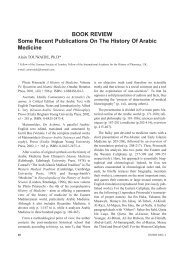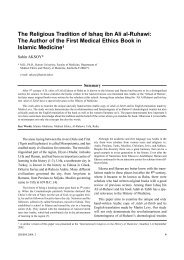Islamic Medicine History and Current Practice - International Society ...
Islamic Medicine History and Current Practice - International Society ...
Islamic Medicine History and Current Practice - International Society ...
- No tags were found...
You also want an ePaper? Increase the reach of your titles
YUMPU automatically turns print PDFs into web optimized ePapers that Google loves.
THE VALUABLE CONTRIBUTIONS OF AL-RAZI (RHAZES) IN THE HISTORYOF PHARMACY DURING THE MIDDLE AGESSharif Kaf AL-GHAZALcient quantity of cori<strong>and</strong>er water <strong>and</strong> used as eyedrops. Al-Razi followed the same method in his bookBur as-Sa’ah, in which he prescribed remedies to cureailments in one hour, or at least in a short time, so thatthe patient did not need frequently to call on his doctor<strong>and</strong> to pay larger fee.In his other book on diets, their uses <strong>and</strong> disadvantages,Mnafi’al-Aghthiyyah, al-Razi followed a patternthat had been introduced earlier by Galen. In it, al-Raziattempted to correct several errors made by Galen <strong>and</strong>to introduce new data missed by the latter. IbnMasawayh was another physician who wrote on thesame topic. According to al-Razi, Ibn Masawayh didmore harm than good in his exposition of the subject.These misgivings challenged al-Razi to undertake thewriting of a comprehensive study, Mnafi’ al-Aghthiyyah which is of great interest not only to pharmacy<strong>and</strong> medicine but to the history of the culinaryart as well. Emphasizing specific matters <strong>and</strong> generalregulations for healthy living, al-Razi discussedbreads, waters, dairy products, fruits, vegetables,spices, meats, <strong>and</strong> fishes. He explained in detail theirkinds, methods of preparation, physical properties, <strong>and</strong>therapeutic modes of action, <strong>and</strong> pointed out whenthey were useful <strong>and</strong> when not. He described the disadvantagesof frequent consumption of wines leadingto alcoholism, ‘which often causes many serious diseasesas epilepsy, paralysis, senile tremor in older people,cirrhosis, hepatitis, mental disorders, visionarydistortions, obesity, debility, <strong>and</strong> impotence.While al-Razi paid much attention to curing thebody’s ills, he did not ignore cures for infirmities ofthe soul. The proof of his concern for psychotherapyseems quite evident. On completing his medicalencyclopaedia, al-Mansuri, on the diagnoses <strong>and</strong>treatment of body diseases, he filled in the gap bywriting a counterpart at- Tibb ar-Ruhani on the medicineof the soul. His concern for, <strong>and</strong> penetrationinto, human nature, its complexities, <strong>and</strong> the directionsleading into it, confirm his appreciation of theimportance of psychotherapy <strong>and</strong> psychology as twoimportant parts of the healing art.In his famous al-Mansuri, however, al-Razidevoted four out of the book’s total of ten treatises, todiets <strong>and</strong> drugs, medicated cosmetics, toxicology <strong>and</strong>antidotes, amelioration of laxatives, <strong>and</strong> compoundedremedies, all of which are of pharmaceutical interest.JISHIM 2003, 2Al-Razi’s last <strong>and</strong> largest medical encyclopaedia ishis al-Hawi fit-Tibb, which embraces all areas ofmedical knowledge of the time. It included sectionsrelated to ‘pharmacy in the healing art’, materialsarranged in alphabetical order, compounded drugs,pharmaceutical dosage forms <strong>and</strong> toxicology. It alsoincluded numerous medical recipes <strong>and</strong> tested prescriptionsthat influenced ‘medical therapy’ in Islam<strong>and</strong> in the West during the Middle Ages. In his use ofmineral drugs as external <strong>and</strong> internal remedies,including vitriols, copper, mercuric <strong>and</strong> arsenic salts,sal ammoniac, gold scoria, chalk, clay (as in the terrasigillata <strong>and</strong> Armenian clay), coral, pearl, tar, <strong>and</strong>bitumen, al-Razi, encouraged <strong>and</strong> pioneeredchemotherapy in <strong>Islamic</strong> medicine.Although he recommended poppies <strong>and</strong> opium internallyas somniferous agents <strong>and</strong> to quiet coughing, <strong>and</strong>externally to relieve eye <strong>and</strong> wound pains, he warnedagainst their deadly effects (two drams are fatal).ConclusionThe development of professional pharmacy, as aseparate entity from medicine, started in Islam underthe patronage of the early’ Abbasiyyah caliphs inBaghdad. This first clear-cut separation of the two professions,<strong>and</strong> the recognition of the independent, academicallyoriented status of professional pharmacymaterialized in the Abbasiyyah capital (Baghdad) <strong>and</strong>Al Razi was one of the few pharmacists who addedvery valuable contributions to medicine <strong>and</strong> pharmacywhile most of Europe was still living in the dark ages !REFERENCES1. Aftab M: How Islam Influenced Science. <strong>Islamic</strong> Herald.March 1995.2. Hadzovic S: Pharmacy <strong>and</strong> the great contribution of Arab-<strong>Islamic</strong> science to its development. Med Arh. 1997;51(1-2):47-503. Irfan H: Hikmat (Unani <strong>Medicine</strong>). Published in Islam onlinewebsite on 29/06/20024. University of Florida <strong>Society</strong> for the <strong>History</strong> of <strong>Medicine</strong>presents: The <strong>History</strong> of <strong>Medicine</strong> Lecture Series. Websitehttp://www.medinfo.ufl.edu/other/histmed/5. In Abi Osaiba’a: Oyon Al-Anba’a Fi Tabaqat Al Ateba’a.Dar al Hayat - Beirut 1965. (in Arabic).6. Esk<strong>and</strong>er AZ: Analysis study about Al-Razi. Engl<strong>and</strong>.7. Al-Ghazal SK: <strong>Islamic</strong> <strong>Medicine</strong> OnLine.http://www.islamicmedicine.org/11



